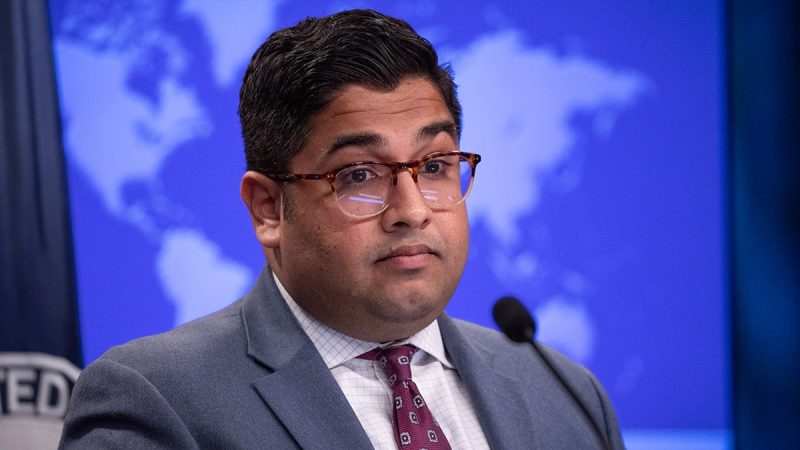
State Dept stresses no conclusion on Israel’s possible international law violations after critical report
State Department spokesman Vedant Patel stressed on Monday that no conclusions have been reached by the U.S. on whether Israel possibly violated international law in Gaza after a critical report on Friday.
‘The report makes clear that this is a very complex and complicated battlefield. It is a very dense and urban setting. We are also dealing with the belligerent, in this case, Hamas, that has a clear track record and history of co-locating itself with civilians and civilian infrastructure, using civilians as human shields,’ Patel told reporters at a press conference. ‘The IDF has undertaken steps to implement international humanitarian law obligations for the protection of civilians in the current conflict.’
‘We also are clear in our report that it’s reasonable to assess that defense articles covered under the National Security Memorandum has been used by Israeli security forces in instances that are inconsistent with its obligations. But we also have no direct indication of Israel intentionally targeting civilians,’ he added. ‘Israel does have a number of ongoing active criminal investigations pending, and there are hundreds of other cases under administrative review. Israel has taken steps to and is taking steps to hold itself and its actions accountable.’
His remarks come after Secretary of State Antony Blinken delivered an overdue national security memorandum to Congress on Friday that said Israel’s use of U.S.-provided weapons in Gaza likely violated international humanitarian law, though wartime conditions prevented American officials from determining that for certain in specific airstrikes. The critical report also noted Israel has had to confront an ‘extraordinary military challenge,’ as Hamas ‘has embedded itself deliberately within and underneath the civilian population to use civilians as human shields.’
The report states Hamas ‘intentionally uses schools, hospitals, residential buildings, and international organization facilities for military purposes’ and ‘constructed a vast tunnel network beneath this civilian infrastructure not to protect civilians, but to hide its leaders and fighters and from which it stages and launches attacks.’ Hamas also continues to hold more than 100 hostages in Gaza.
‘Given the nature of Hamas’s track record of co-locating itself with civilians using civilians as human shields, we’re unable to make a conclusive determination as it relates to violations of international humanitarian law,’ Patel said on Monday. ‘There is a moral and strategic imperative to take every possible step to minimize civilian casualties, steps that we know that the IDF has the tools and the capability to undertake.… But simultaneously that this is also a belligerent that is using civilians as human shields. And therefore, we’ve not been able to come to any kind of conclusive conclusion on this.’
‘We didn’t issue this memorandum because we thought any country was necessarily violating these standards,’ he added. ‘Instead, we wanted to be transparent about the standards that we require countries to adhere to and offer an assessment of a certain time period that the national security memorandum is consistent with.’
Blinken on Sunday delivered some of the Biden administration’s strongest public criticism yet of Israel’s conduct in the war in Gaza, saying Israeli tactics have meant ‘a horrible loss of life of innocent civilians’ but failed to neutralize Hamas leaders and fighters and could drive a lasting insurgency. In a pair of TV interviews, Blinken underscored that the United States believes Israeli forces should ‘get out of Gaza,’ but also is waiting to see credible plans from Israel for security and governance in the territory after the war.
Hamas has reemerged in parts of Gaza, Blinken said, and ‘heavy action’ by Israeli forces in the southern city of Rafah risks leaving America’s closest Mideast ally ‘holding the bag on an enduring insurgency.’
He said the United States has worked with Arab countries and others for weeks on developing ‘credible plans for security, for governance, for rebuilding” in Gaza, but ‘we haven’t seen that come from Israel…. We need to see that, too.’ Blinken also said that as Israel pushes deeper in Rafah in the south, a military operation may ‘have some initial success’ but risks ‘terrible harm’ to the population without solving a problem ‘that both of us want to solve, which is making sure Hamas cannot again govern Gaza.’
More than a million Palestinians have crowded into Rafah in hopes of refuge as Israel’s offensive pushed across the Gaza Strip. Israel has said the city also hosts four battalions of Hamas fighters.
Israel’s handling of the war, Blinken said, has put the country ‘on the trajectory, potentially, to inherit an insurgency with many armed Hamas left or, if it leaves, a vacuum filled by chaos, filled by anarchy, and probably refilled by Hamas. We’ve been talking to them about a much better way of getting an enduring result, enduring security.’
The Associated Press contributed to this report.
